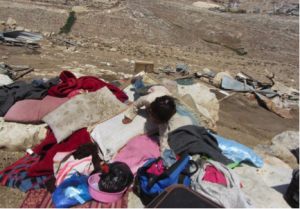
|
Budget discriminates against residents of East Jerusalem The Knesset Interior and Environmental Protection Committee
Every year Jerusalem receives a special budget under the Basic Law: Jerusalem, Capital of Israel. This discussion focuses on issues with respect to the municipality’s use of these funds.
ACRI’s position: The Palestinian residents of Jerusalem, who comprise almost 40% of the city’s population, suffer from unimaginable systemic abuse by the Israeli authorities. Investment in this population is limited to a few precent of the total budget and resources. Approximately 75% of Palestinians living in Jerusalem live below the poverty line and Palestinian neighbourhoods are the most neglected in the city. Municipal services such as garbage collection, roads and lighting are minimal; public buildings and facilities such as schools, kindergartens and playgrounds are in seriously poor condition; and there is a lack of industrial and commercial areas and social and cultural centers. The situation has worsened in recent years due to the Separation Wall. As long as Israel controls East Jerusalem and the Palestinians living in these neighbourhoods are residents of Israel, the state is obliged to treat them equally and to allocate appropriate resources to these areas.
|
|
The response of the education system to the security situation The Education, Culture and Sports Committee
ACRI’s position (In accordance with the Forum of Organizations for Co-existence Education): The current security situation requires the educational system to prepare accordingly, in order to respond to the teachers, students and parents who are experiencing the wave of violence, racism and incitement both within and outside of schools. Unless this is addressed by the educational system, the radical voices heard on the street, in the media and across social networks may impact on students, causing them to feel threatened or afraid. It is the role of the education system to accommodate these feelings, and to give students the right tools to cope and voice just and moderate values.
The entire education system needs to prepare and respond to staff facing complex emotional, social and educational situations; and to encourage the implementation of programs and lesson plans that foster dialogue about current events in an open and respectful way. Various educational initiatives are already taking place. The current program formulated by the Ministry of Education, needs to be developed into a budgeted and systemic action plan that takes into account the different needs of various educational institutions. Another useful initiative would be to improve the accessibility of educational materials, developed by educational organisations and human rights organisations and approved by the Ministry of Education, to schools and classes across the education sector.
Click here to learn more about ACRI’s work on anti-racism education (in Hebrew)
|
|
The implications for Bedouin Villages of the plan to build a mine in Sde Barir The Committee on the Implementation of Accessibility of government information to the public and Principles of transparency
Entrepreneurs from Rotem Amfert Negev Ltd promoted the Sde Barir plan to build a phosphates mine just 3 kilometers from Arad, the Arab-Bedouin settlement of Kuseife and several other Bedouin villages. Residents of the Negev have strongly opposed the plan, due to the health risks that would result for people living in the area.
ACRI’s position (with Bimkom – Planners for Planning Rights): The focus is on the planning implications of the program for residents in the area, and in particular the Arab-Bedouin citizens in the Negev. The plan for the mine ignores the fact that the designated area is home to approximately 10,000 Arab Bedouin civilians in three villages – Ala’zh, Al-Za’arura and Al-Fura. These three historic villages existed prior to the establishment of Israel and have been seeking recognition and planning regulations for decades. Promotion of the Sde Barir plan perpetuates planning policies that discriminate against the Arab-Bedouin citizens of the Negev, and demonstrates once again how the interests of investors are promoted over finding solutions to the housing shortages faced by the population, who have lived in the same area for many years.
|
|
In the Spotlight 6 November 2015 – Jerusalem Post  A girl climbs on top of belongings that were in illegal structures in the Bedouin Al-Khdeirat community. (Photo credit: B’TSELEM) “The government continues its efforts to resettle Bedouin from unrecognized villages in the Negev into legal ones, but there appears to be no official policy or strategy in place.
“The government is interested in a quick solution such as the Prawer-Begin bill, but after such long neglect over the decades, a just solution could be in the form of recognizing the unrecognized villages, providing the basic services of water, electricity, schools and healthcare,” she [ACRI Attorney Sana Ibn Bari] said.
Ibn Bari speculates that perhaps the government now understands that it cannot push forward the Prawer Plan since it would again encounter strong domestic and international objections.”
To receive the Knesset Roundup directly to your email, click here. |







